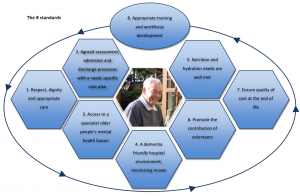South West Hospital Standards in Dementia Care
Standard 1: People with a dementia are assured respect, dignity and appropriate care
- A Ward Champion for dementia is appointed to provide leadership for delivery and monitoring (where applicable), as well as training
- There is accessible literature on the ward for patients, carers and staff
- The care plan is person-centred for each patient
- There is individualised and appropriate risk assessment
- Patient care is person centred, informed by Dementia Care Mapping or similar methodology.
- The trust Board regularly reviews serious and untoward incidents, falls, delayed discharges, and complaints associated with patients with dementia
Standard 2: Agreed assessment, admission and discharge processes are in place, with care plans specific to meet the individual needs of people with a dementia and their carer.
- The lead carer is identified and provided with information about how they can support the patient
- A booklet ‘This is me’ about each patient is completed to inform care plans
- All patients with suspected dementia receive a comprehensive assessment with further referral to memory service if required
- Carers receive information about the assessment
- Carers understand that an assessment of their needs can be arranged
- There is a system so that all staff are aware of the patients with dementia
- Discharge is actively managed from 24 hours of admission
- Information on discharge /support available on admission
- There is a named person who takes responsibility for discharge coordination
- Discharge plans summarise assessment and treatment and support plan
- There is access to intermediate care
Standard 3: People with a dementia or suspected cognitive impairment who are admitted to hospital, and their carers/families have access to a specialist mental health liaison service
- There is access to a full multi disciplinary, specialist mental health liaison service. The level of service is based on assessed need
- Appropriate referrals are made for further assessment
- Training provided by liaison teams is incorporated into local training strategies
Standard 4: The hospital and ward environment is dementia-friendly, minimising the number of ward and unit moves within the hospital setting and between hospitals
- The hospital Clinical Champion determines appropriate signage and sensory environments across the hospital and reviews quality of environment during peak activity so that standards do not slip
- Patients with a dementia should not be moved between wards (or hospital) unless required for their care and treatment
- If a move is necessary it should be at least disruptive time and carers informed and involved if appropriate
- ‘This is me’ profile must accompany the patient is moved
- Daily therapeutic and recreational activities are available where appropriate
Standard 5: The nutrition and hydration needs of people with a dementia are well met
- All patients have a weight assessment and are assessed via malnutrition screening
- Patient preferences are recorded in ‘This is me’
- Protected mealtimes with carers or volunteers actively encouraged to assist
- Flexibility in provision and timing of food and appropriate utensils / crockery
- Access to specialist assessment in 12 hours if swallowing difficulties
Standard 6: The hospital and wards promote the contribution of volunteers to the well-being of people with a dementia in hospital
- There is designated leader within hospital to promote volunteering for people with a dementia
- The Ward Champion identifies ways to improve patient experience by greater involvement of volunteers
- Support, feedback and training provided to volunteers
- Regular review of recruitment and retention of volunteers
Standard 7: The hospital and wards ensure quality of care at the end of life
- GPs are informed of patients identified as approaching end of life
- Patients who remain in hospital to die are cared for using an integrated care pathway
- All clinical and support staff receive appropriate training
Standard 8: Appropriate training and workforce development are in place to promote and enhance the care of people with dementia in general and community hospitals, and their carers/families
- All new staff receive mandatory training
- The hospital has a training and knowledge framework in place which is being implemented and reviewed

